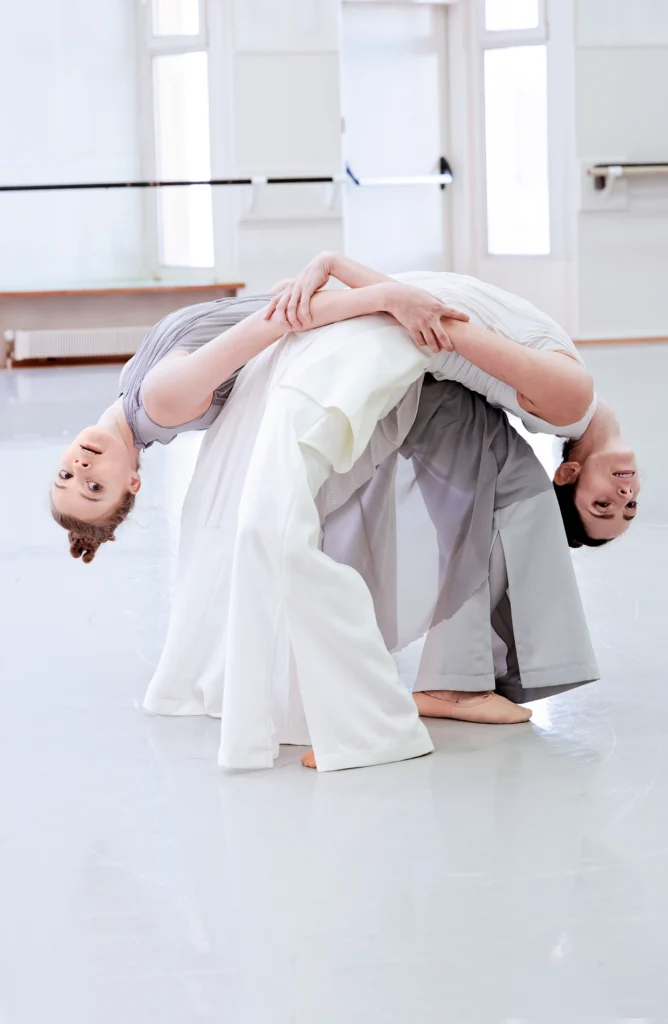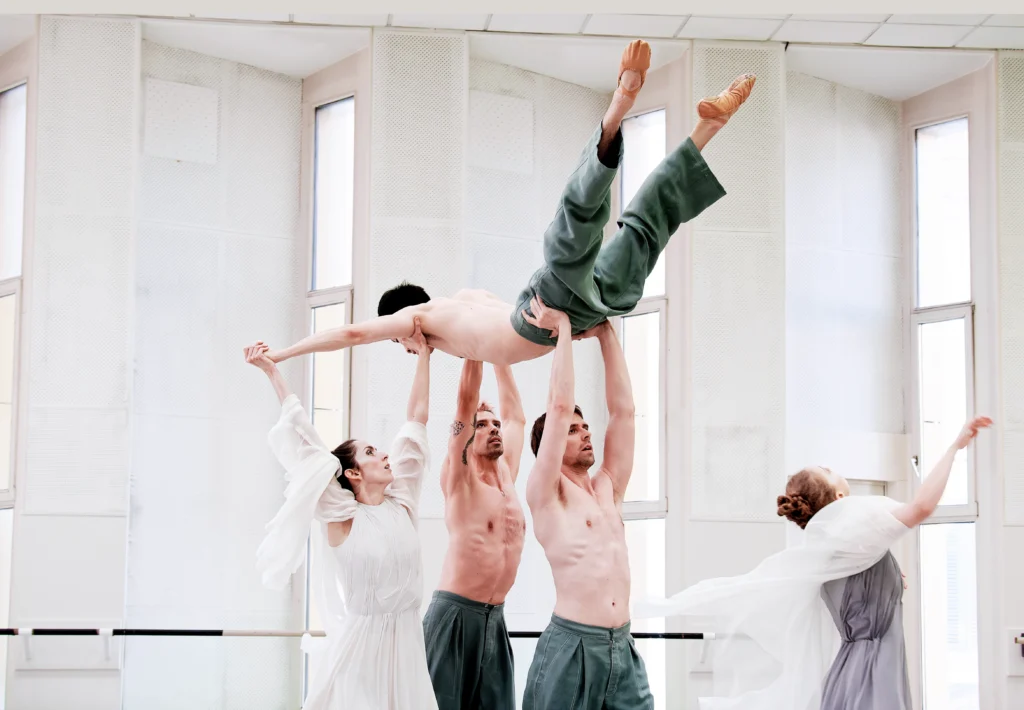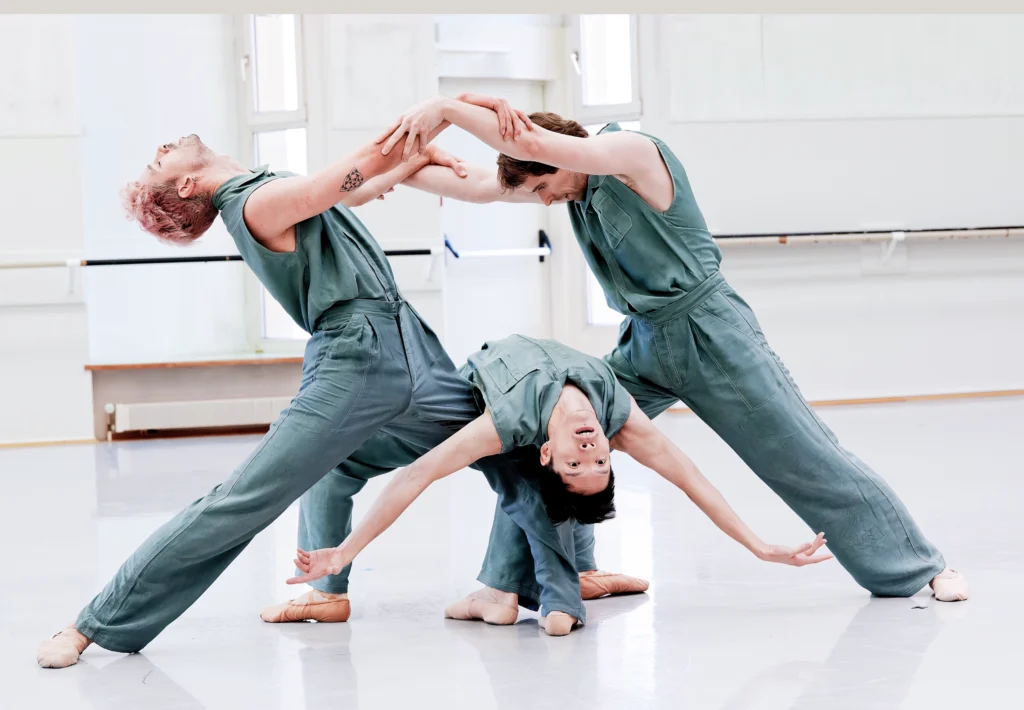Choreographers line up to update Swan Lake or The Rite of Spring, but Apollo and other Balanchine classics haven’t inspired nearly as many reinventions—until now. In France, the country where Apollo premiered in 1928, 31-year-old Brett Fukuda uses a female perspective to reinterpret the story of the youthful god nurtured by a trio of muses in Muse Paradox, her first main-stage commission for the Ballet de l’Opéra national du Rhin.
While Fukuda has been a dancer with the French company since 2018, she is no stranger to Balanchine. Growing up in the U.S., she completed her early training at the School of American Ballet before dancing with Boston Ballet from 2014 to 2018.
Prior to Muse Paradox, which premieres at the Strasbourg Opera on January 13 alongside creations by Ballet du Rhin’s director Bruno Bouché and Gil Harush, Fukuda had only choreographed two dance video projects and a main-stage solo. Yet as her cast of two women and three men ran through Muse Paradox in the company’s studios in December, she fine-tuned details with purposeful dramatic clarity—and a few witty nods to Apollo.
de l’Opéra national du Rhin.
Fukuda spoke to Pointe about her path to taking charge in the studio and the task of tackling the “untouchable” Balanchine repertoire.
How did this project begin?
Last season, Bruno [Bouché] called me into his office and said that he had developed a program using only music for strings, around the theme of rethinking American classics. He knew my background, and he pitched the idea of reimagining Balanchine’s Apollo to me. I was shocked, because I thought he wanted to talk about my dancing or my place in the company; I had just spoken up about gender equality and a pay differential between men and women. He actually said that my outspokenness inspired him.
Was choreography something you’d considered as a path?
I’ve realized that when I’m told that I can’t or shouldn’t do something, it makes me want to do it more. That’s kind of what happened: I never imagined myself as a choreographer, and I think it’s because at SAB, the women who trained me were demonstrating that the highest achievement for me as a student was to be chosen—by Peter Martins, or, in their case, by Balanchine. I was only 10 years old, so I just absorbed that and never imagined myself doing the choosing.

de l’Opéra national du Rhin.
Were there specific moments that helped change your mindset?
My director at Boston Ballet once told me, “I feel that you’re often a young girl. I would like you to be more of a woman onstage.” It was a little bit hurtful, but I reflected on the opportunities I’d had; I had been Canary Fairy, Juliet’s friend, Aurora’s friend. It was hard for me to find my voice because I was always put into a “cute” box as a dancer. So it started for me as more of a frustration with the roles that had shaped my identity.
Did it play a part in your decision to move to France?
I was experiencing burnout as a corps member in Boston. I wanted to try something totally new and change my experience of the field. We do more creations here, and it’s been really interesting to figure out the ways in which I insert my identity into steps. I never thought of that as hints of being a choreographer, but it kind of was.
How did you initially react to the idea of reinventing Apollo?
My first reaction was: I wouldn’t dare. I had learned all the muses’ variations in the school, and at SAB, you’re fed that those works are untouchable. In my head I was like, Does it need to be remade? Where is the space for that? The first exercise for me was just listening to Stravinsky’s music every day and trying to hear it with a clear head. I was careful to not watch the original too much because it was really hard to erase what had been imprinted in my imagination.
Apollo is often considered a metaphor for Balanchine’s own artistic journey. How did you go about reworking the characters?

de l’Opéra national du Rhin.
When Bruno first proposed it, he wanted to have Apollo be a woman. But to me, the muses are actually more interesting than Apollo, so there’s no Apollo in Muse Paradox: I have three men, but their role is quite abstract. I really wanted to analyze my experience as a woman in the world of ballet through the lens of the muse. On the one hand you’re glorified, and on the other hand, there are all these constraints. It felt like the perfect piece to talk about this, because Apollo is a creation about creation.
There are two different interpretations of the muse in my piece. One is the Grecian muse, a very autonomous and powerful figure, who chose which man she wanted to bestow creative genius upon. Then there’s the other representation of the muse, who inspires men but doesn’t have as much autonomy. The two women in the main cast who portray these roles, Julia Weiss and Lara Wolter, are also at different stages in their career, and I wanted that to reflect the life of a dancer—how at a certain point, you realize that you won’t succeed if you’re just begging to be chosen. Or you just want to be your own muse.
The more powerful muse bestows inspiration in a pas de deux that reverses the male–female roles in partnering. How challenging was it to choreograph?
I started with just the male dancer, Cauê Frias. He taught me how to do a promenade, and I taught him how to get promenaded. A lot of it was really clumsy, but that’s how we worked through the whole duet, this exchange of information. Of course, there weren’t so many lifts we could do, but it forced a certain creativity. Initiating the movement actually came more naturally to Julia than being partnered came to Cauê, because it was hard for him to relinquish control.
How did you approach the costumes for Muse Paradox?
I knew I wanted the women clothed, because my experience throughout my career has been the men in a five-piece suit and the women in a leotard, and I’m tired of that. It’s really hard to feel free in your movement and empowered in your stance if you’re thinking of the way the light might show your cellulite. The women actually add layers as the piece goes on, while the men remove some.

There are subtle references to the original choreography throughout. How has your own relationship to Balanchine evolved over time?
Since I’m taking a lot of distance in terms of the dramaturgy, I thought it would be nice to have some “Easter eggs” [the trio of men crisscrossing their legs like Balanchine’s muses, for instance] for those who know Apollo very well. In Boston, the times when I felt most free were in Balanchine ballets because the corps is not stagnant. Having that Balanchine base also allowed me a smoother transition into contemporary work; I didn’t realize the ways in which that freedom of the torso could translate into Ohad Naharin, for instance.
But the podcast The Turning: Room of Mirrors was hard for me to listen to. My teachers at SAB made it sound like those were the glory days, but how many dancers were lost because they didn’t have an obedience to that culture? When you wonder where the female choreographers are, you have to ask yourself about the way women and young students are treated. Maybe those more sensitive students were offering something different that could be nurtured in a different direction.


